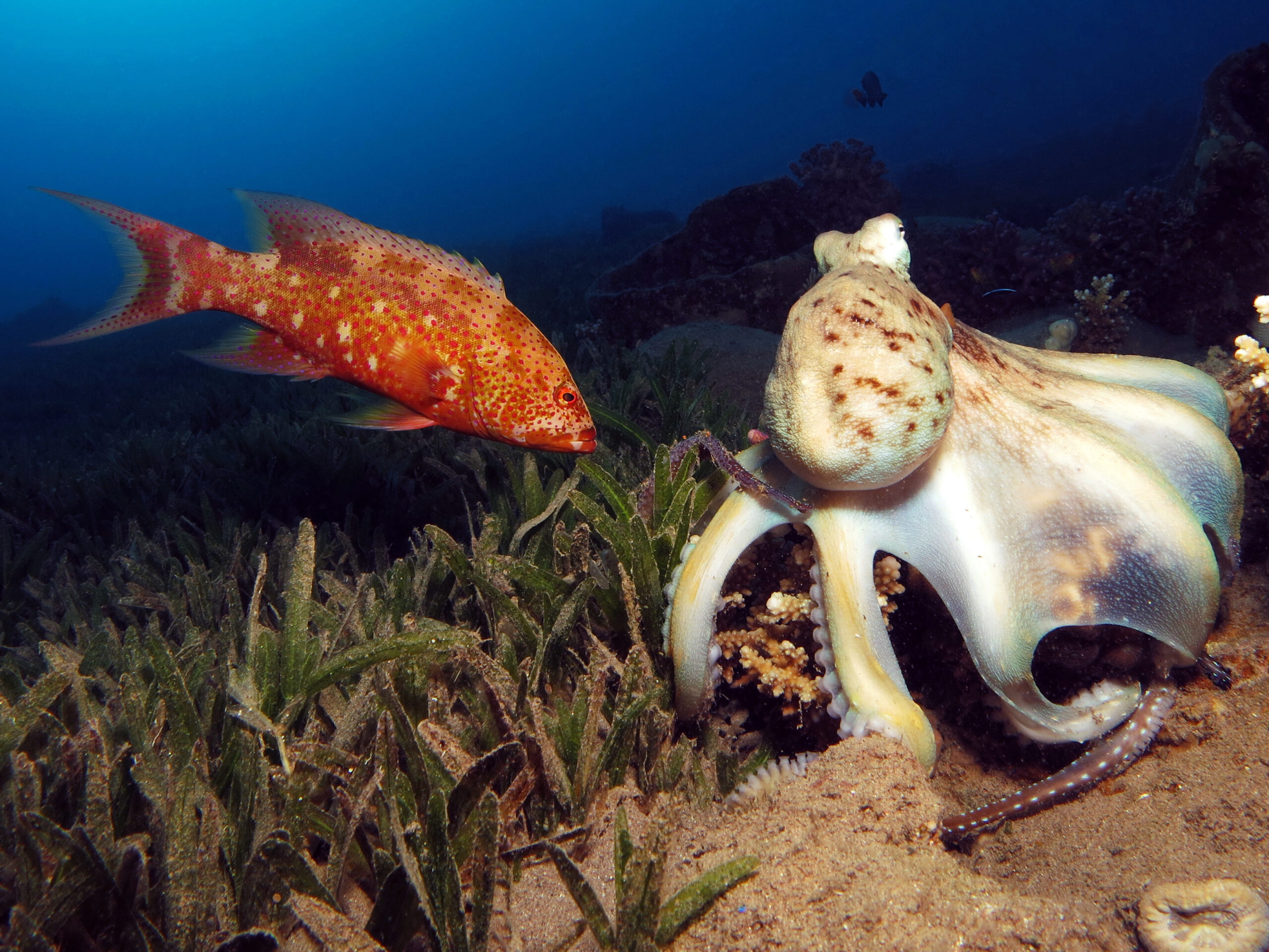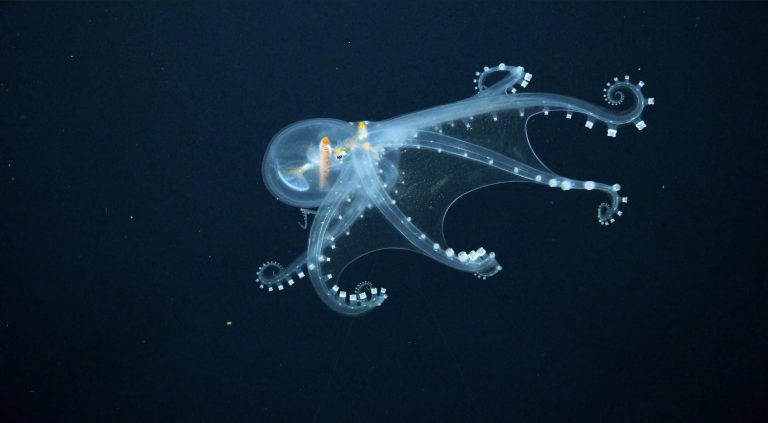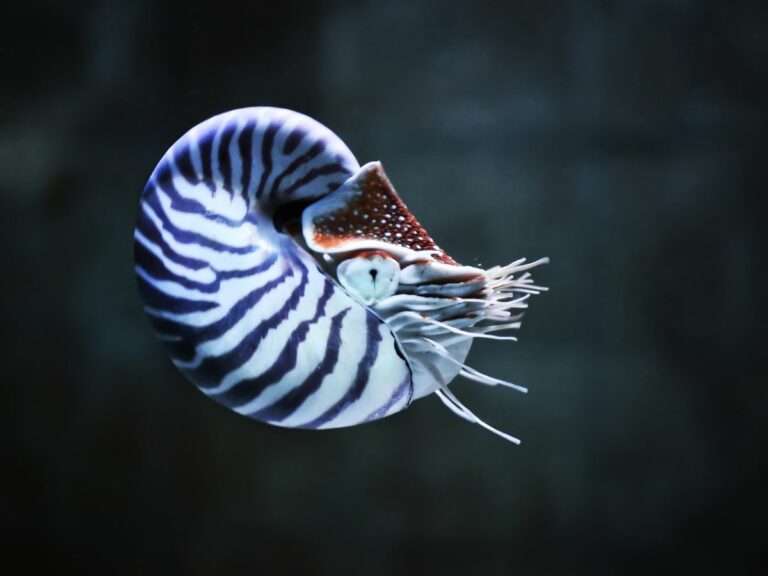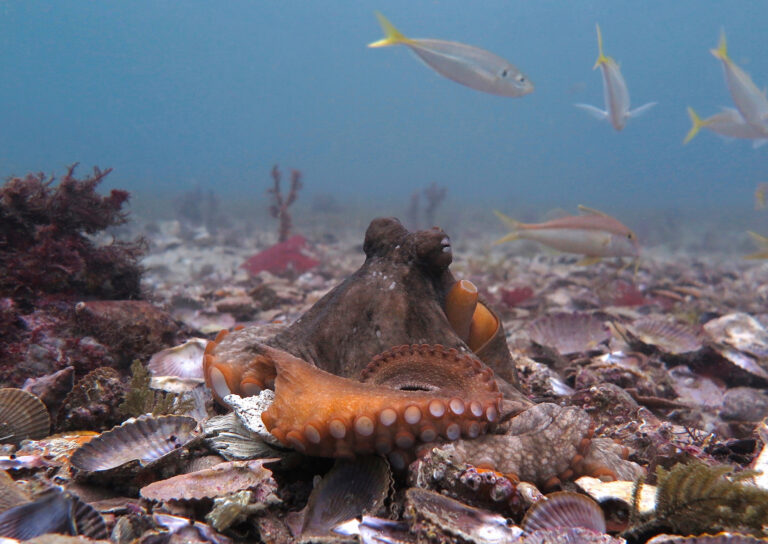The Octo-Punch: The Truth Behind Why Octopuses Punch Fish
While observing a day octopus exhibiting hunting behavior, Eduardo Sampaio, an octopus scientist, witnessed the octopus deliver an octo-punch as it scoured for food. Learn the truth behind why octopuses punch fish out of “spite”.
It’s the middle of the day in the Red Sea. The day octopus (Octopus cyanea) has left its den – a rock crevice – to begin scavenging for food on the seafloor. The octopus begins to check reef crevices for unsuspecting crabs, clams, and fish to eat.
Thanks to the animal’s long arms, even well-hidden critters may be in danger of becoming this octopus’ breakfast.
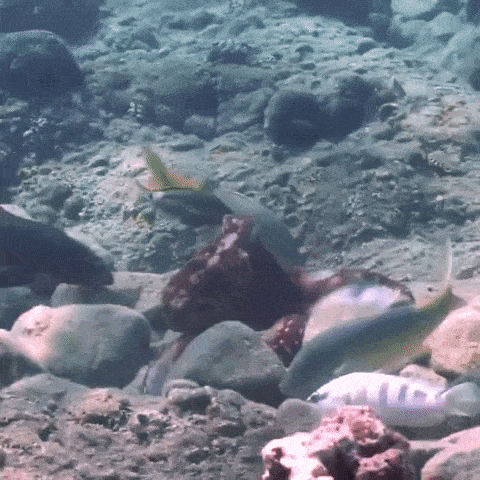
The Day Octopus’s Hunting Behavior
Like most octopuses, this day octopus lives a solitary life, only meeting up with other octopuses to breed. Except for today, this day octopus is not alone.
The animal’s hunting behavior has attracted the company of some local fish including:
- Lyretail grouper (Variola louti)
- Tailspot squirrelfish (Sargocentron caudimaculatum)
The day octopus cannot out-maneuver these much faster fish. Instead, it must tolerate their company.
Fortunately for the octopus, the lyretail grouper sometimes helps out with the hunt.
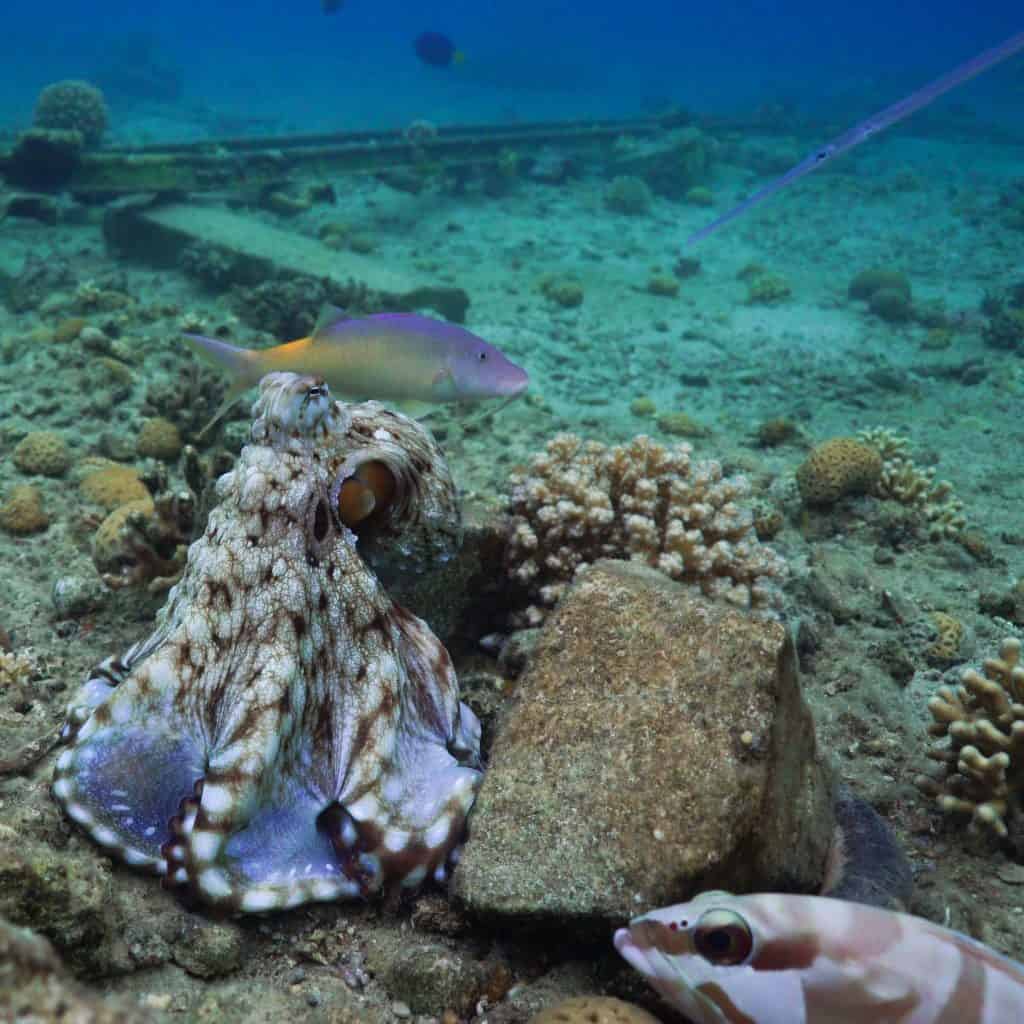
How The Lyretail Grouper Helps The Octopus Hunt
Using special headshakes, the grouper can ‘tell’ the octopus where lost prey is hiding, out of the grouper’s reach. The octopus, being much better suited to retrieving prey out of crevices, is given an easy opportunity for food.
If the octopus fails and instead frightens the fish out of its hiding spot, the grouper may have a second chance to eat the lost meal.
When they team up, both the octopus and grouper have a greater chance of landing a meal.
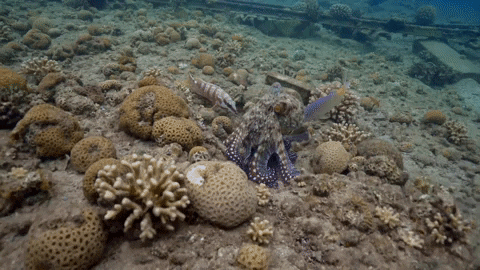
(multi-specific hunting group )
Does The Tailspot Squirrelfish Help The Day Octopus Hunt As Well?
The same cannot be said for the tailspot squirrelfish.
The squirrelfish does not help the octopus find food. Instead, the squirrelfish follows along with the hope of winning a free snack, like a sparrow waiting for crumbs at a park picnic.
There’s not much the day octopus can do about the thieving follower. It can’t outswim the squirrelfish, and the octopus needs to eat.
But, there is one trick of the day octopus’ sleeve – an octo-punch.
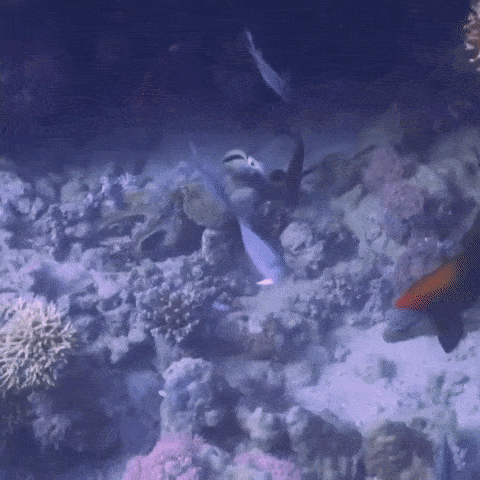
The Octo-Punch: How Octopuses Retaliate
While the punch takes some effort on the octopus’ part, it can literally move the squirrelfish out of the octopus’ way. This helps in preventing the fishy thief from stealing the octopus’ meal.
Yet, thieving squirrelfish are not the only type of fish to fall victim to the day octopus’ punch.
The day octopus has been caught on film punching six other species of fish – including the helpful lyretail grouper.
After most of these blows, the octopus expands its body over the area where the punched fish was just a moment before, presumably to cover and consume the source of conflict: food.
However, there are unusual instances where the octopus does not get a food reward for issuing a punch.
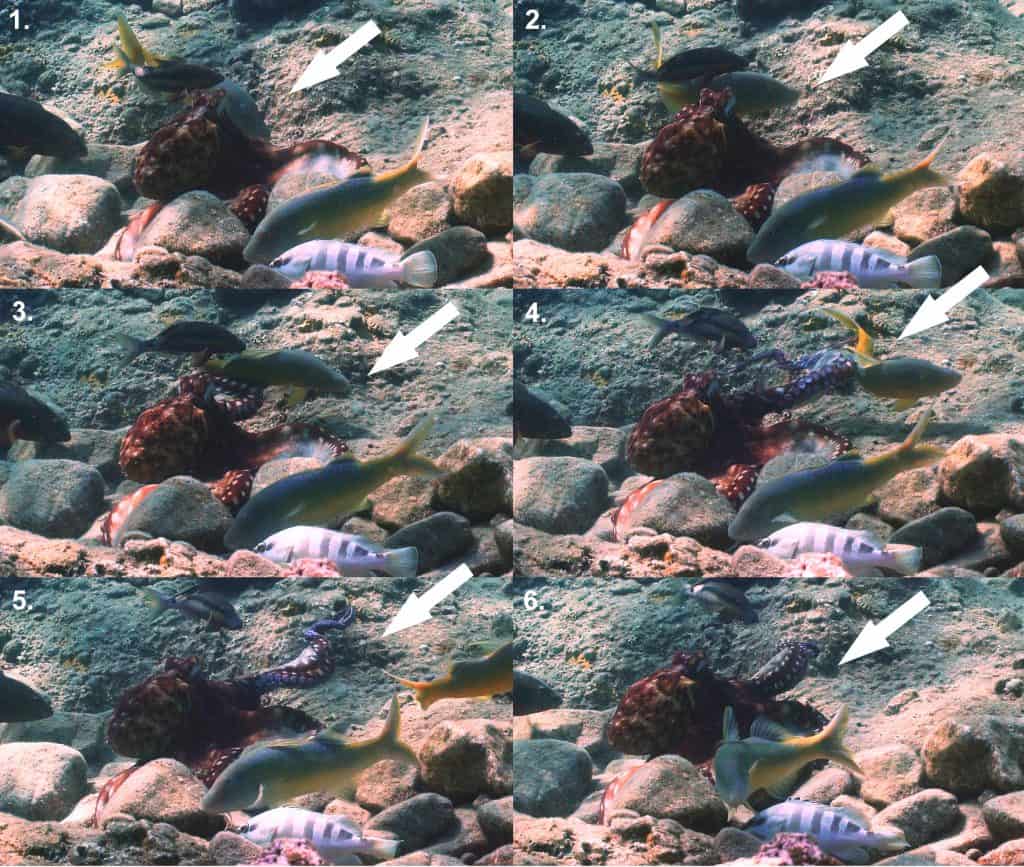
Octopuses Punch Fish For Meals: Are They Successful?
According to octopus scientist Eduardo Sampaio (who collected the footage of the day octopus’ punches), when the octopus delivers a punch after food has been stolen, the octopus’ blow may instead be penalizing a successful thief.
Even though the punch costs the octopus some of its energy, it could be worthwhile for the octopus in the long run. Especially, if it changes a thieving fish’s future behavior.
For this to be the case, the day octopus needs to have an appreciation for the future – an indication of intelligence.
However, Sampaio says more research is needed to support this conclusion.
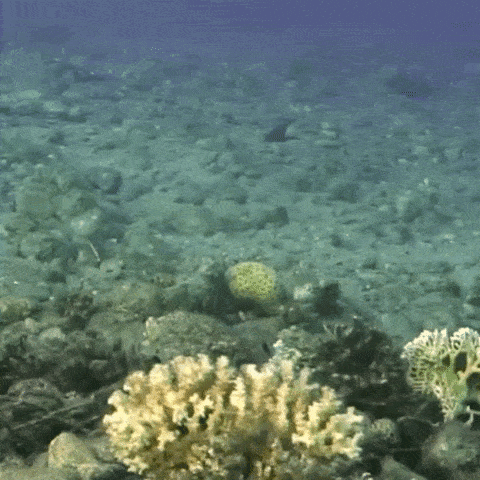
When Octopuses Punch Fish, Do Fish Retaliate?
Using the footage of the day octopus’ punches, Sampaio and his fellow octopus scientists now want to know if fish behavior changes after receiving a blow, or if a fish thief is forever a thief.
The scientists are also interested to see if the day octopus punches some fish species more often than others. But, they will need to collect more rare octo-punch footage to see if the octopus punches certain fish more frequently.
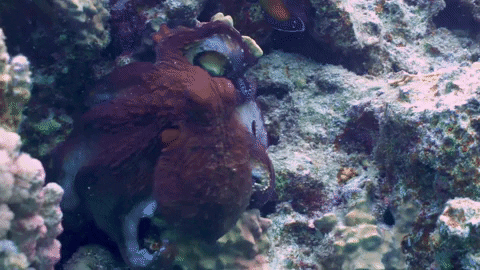
Day Octopus Transforming Color & Texture (Deimatic Behavior)
The Real Truth Behind The Octo-Punch
Whether the octopus lands a punch to protect against food theft or to reprimand a successful thief, octo-punches are how the day octopus protects its prey.
“If the octopus is being exploited, the only thing that he can do is go back to the den and stop hunting. He cannot go hunt in another place because the grouper will just follow,” Sampaio explains.
“Whereas if the grouper is getting exploited, the grouper can just leave and go hunt somewhere else because the octopus cannot follow the grouper at maximum speed.”
So, yes- an octopus punch may seem aggressive. But, these octopus scientists suggest the sucker-punches are actually how the day octopus defends itself from its quick competitors.
Watch The Live Video Here!
Looking to learn more about Eduardo Sampaio’s octopus research? You can connect with him and other octopus lovers via the OctoNation Facebook group, OctopusFanClub.com!
Make sure to follow us on Facebook and Instagram to keep up to date with the conservation, education, and ongoing research of cephalopods.
✨Click here to Adopt an Octopus!✨
More Posts To Read:
If you enjoyed learning about why octopuses punch fish, take a look at some of these species profiles:

Liz is a marine biologist, environmental regulation specialist, and science writer. She’s previously studied Antarctic fish, seaweed, and marine coastal ecology.
